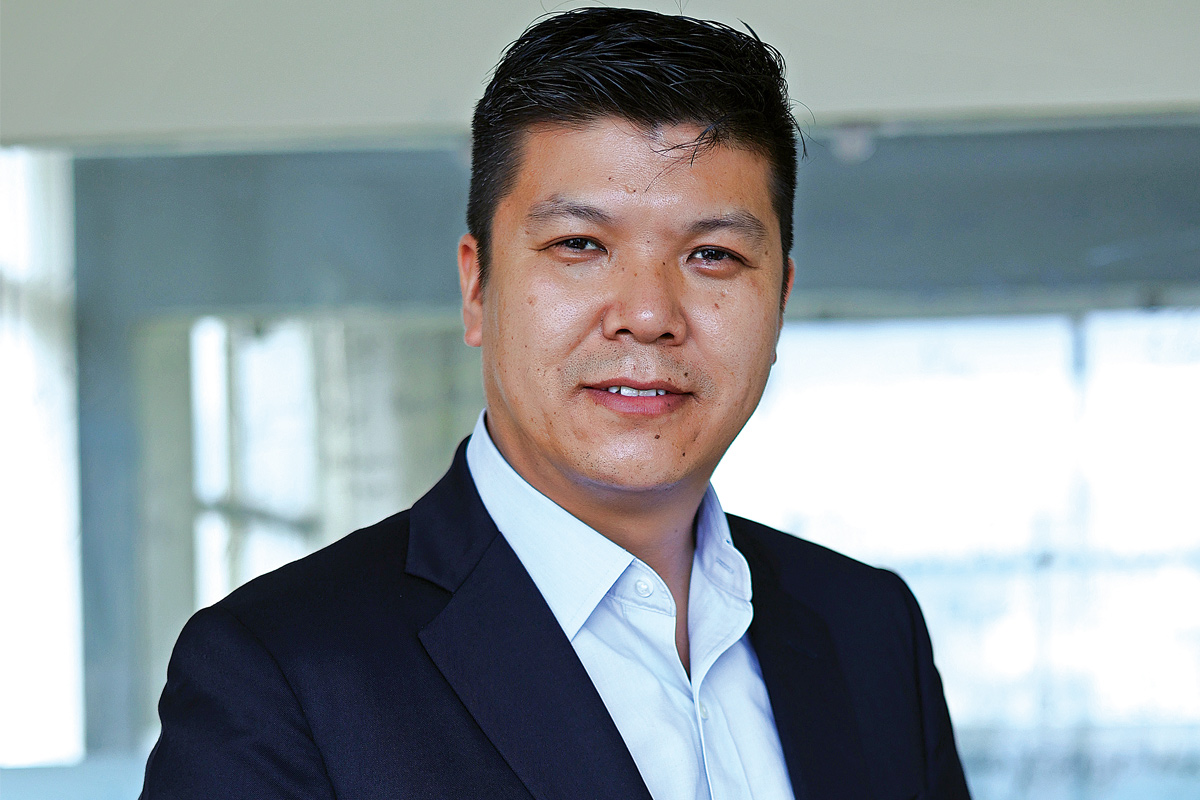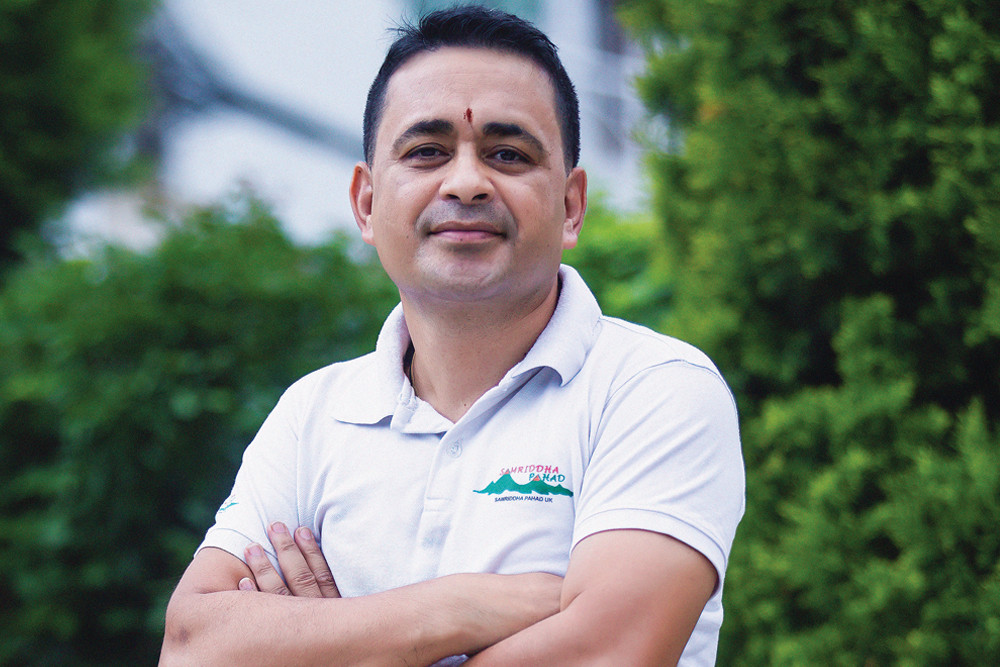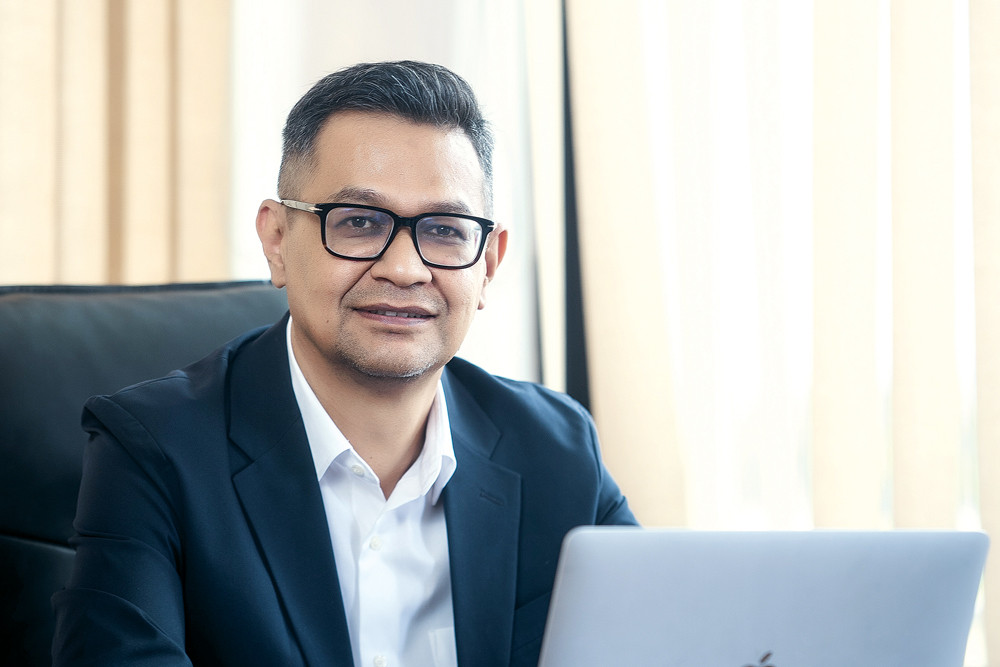
The Executive Chairperson and Co Founder of Idea Studio that mentors students to help them realise their ideas in innovation and entrepreneruship, Dr Tshering Lama prefers to call himself an enabler and not a leader. He says, “I just try to provide a suitable platform for them to achieve their goals.”
It is interesting to note that though Dr Lama is involved with a venture that is basically an ideas incubation centre, his background is in the public health. The man from the mountain, as he calls himself in reference to his birthplace of Sermathang in Helambu, he shares that his entrepreneurial journey actually started when he was doing his doctorate in telemedicine in the United Kingdom. Dr Lama clarifies that entrepreneurship does not always mean opening your own business. “When you begin to think and act on a certain idea, the entrepreneurial journey starts from there because you never know when one small idea could turn out to be a major business in the future,” he says.
Dr Lama says that health, education and livelihood are the three areas that a state needs to focus on to be recognised as a well-developed country. He emphasises that health is everyone’s business because you cannot get anything done if people are unhealthy. “And by heath we don’t mean only the absence of disease but access to quality and affordable healthcare too,” he elaborates. For instance, the Covid 19 pandemic was an eye-opener about the state of the healthcare system in Nepal, which is totally lacking.
In this issue of Business 360, Dr Lama, who has been involved with mentoring youths understand the various nuances of startup ethos or what goes into making one successful speaks about the various opportunities and challenges for startups in Nepal and his thoughts on leadership.

How would you define leadership?
For me, leadership is not always about standing in the front and leading. It is also not only about having a vision. At times when you are a leader you need to take ten steps back and push the person who is lagging behind. As a leader you have to make certain that no member of the team is left behind. Moreover, I don’t like to call myself a leader. I would rather be recognised as an enabler. During the course of my work I have met hundreds of youths who come to me with various dreams and innovations. Those ideas they come along with are actually their vision. So, my responsibility is to provide them the platform to realise their vision. Hence, I say a leader does not need to have a vision always. Giving shape to someone else’s visions also entails a lot of leadership.They say change is the only constant in our lives and we always need to change and adapt. How do you view this?
It is absolutely true that change is the only constant. People change, situations change and even technologies change. So, we are all constantly evolving with the changing times. However, I have come to a point where I believe change is not the ultimate thing. I feel rather than just change we need to transform ourselves. Our motto is ‘Igniting Social Change’ but now I want to go beyond that concept and focus more on transformation. There is a difference when we speak about change and transformation. Every morning when we wake up and get dressed for work we put on fresh clothing. We are changing our clothes and what these fresh clothes do is they make us feel comfortable. What I want to emphasise on is even if your clothes are stained we should not be bothered about it. Let there be a stain on my shirt, it is fine with me. What I want is for people to be more focused on the bigger picture of life. Don’t let small things come in your way.
What are the challenges you face most often in your work?
The very reason I chose to start Idea Studio were the challenges that it encompasses. I have always accepted challenges as opportunities. When I was returning to Nepal after my doctorate one of my professors asked me the reason behind me doing so. He actually asked me what was in store for me when I got back home. And my answer was simple – challenges. We are a developing country but the opportunities available here are boundless. There are also many people, especially youths, who have tremendously brilliant ideas but what is lacking is the platform for them to materialise their concepts. I must say I have been very blessed in the sense that I received a lot of support from my family. They invested a lot for my studies and career but not all have the required support. So, I want to be there for those who have the ideas but lack the support. And there is no feeling more satisfying than when you are able to assist others fulfil their goals. I want to invest in others. We all need to comprehend the fact that though we talk a lot about being independent we are actually all interdependent. Somehow or the other we are always connected to other people be it in the family or your work sphere. So, my biggest challenge is giving shape to the ideas that people meet me for. The other challenge that I have to constantly face is people having faith in me and trusting me with their ideas. Speaking in general terms, the other major challenge for us is ‘who we are?’. To be honest, every time I go for international conferences I don’t know what to share with them. We are so blessed with nature but what have we done to utilise and at the same time preserve that? We don’t know what the future of Nepal should be like. Everywhere I go, I find some Nepalis working there. How can we restore that dignity? Can Nepal ever graduate from a destination of cheap labour to that of an intellectual workforce? Now that is our challenge. So in order to do that we need to invest in education. For me, challenge is every day and it is this very challenge that keeps me awake. I want to see my impact. So investment in knowledge is important and many colleges have started doing that and we just enable them. We need to showcase that good things do happen in Nepal.During all these years of leading Idea Studio what do you feel are the major difficulties that startups face in Nepal?
One of the foremost things we Nepalis need to understand is what type of entrepreneurship are we trying to develop. In order to do that we need to understand our history, geopolitical situation, and also the education system that we have at the moment. We could have the aspiration to build a rocket in Nepal but do we have the engineers to see through that? The biggest challenge for entrepreneurship in our country is not being able to match expectations and reality, and confidence and competency. Our expectations are so high but our reality is very minimal or at times non-existent. At times I tell people to keep expectations at zero so whatever you get is a bonus. Before I started Idea Studio I used to run a charity but I soon realised that it so much more valuable as a leader if you are able to teach people how to fish rather than providing them with the fish. As leaders in our respective organisations and careers we need to stress on empowering people. There is so much more dignity involved for the person who knows how to fish rather than waiting for someone to give it to them. For instance, my entrepreneurial journey started from my village when I first started an adult literacy class and then opened a health post. Now, people might say those are social aspects but we have to understand that only when a person is educated, is healthy, will they be able to earn a livelihood by either doing a job or setting up a business. So, two major challenges in Nepal are lack of knowledge and health services. To have a thriving economy these components are unavoidable. We then need to build a system which encourages and helps develop entrepreneurship. The biggest challenge or opportunity regarding entrepreneurship in Nepal that I have witnessed is how to fill the gap between policy, knowledge and practice. And we never have a discourse together. Policies are drafted by the policymakers without consulting the academia or the knowledgeable people. And then knowledgeable people meanwhile never meet the practitioners and ask what type of work needs to be focused on so that the practitioners can do better. Practitioners, on the other hand, never come to the colleges or universities to gather knowledge so that they can improve. Somebody’s crisis is always someone else’s business and that person’s business is always another person’s knowledge. Why don’t we look into that aspect? Until and unless these three things come together we won’t be able to properly develop entrepreneurship in the country. For any kind of startup or idea to thrive is like raising a baby. To give birth you need may be two people and these days one could be enough but to raise the child you need the society. Same goes with any kind of business. I always tell people that ideas and businesses might change but I always look into taking care of the people behind those ideas. Businesses might fail but the person should not fail. And as a leader or rather enabler I try to teach them how to navigate through the challenges.How did the idea of leading an incubation centre crop up?
Besides education and health which I earlier spoke about the third area which is very crucial is livelihood. The reason I am focusing on livelihood is that every parent wants to have a better life for themselves and their children. This very fact attracted me towards founding Idea Studio. I came up with this concept so that people wouldn’t have to ask others to survive. They should be capable enough to earn a living by themselves. Unless people are employed then nothing happens in the society or the country as a whole. Moreover, I wanted people to be job creators and not just job seekers. Once your studies are completed it is natural for you to look for a job. But now I want people to also start thinking about opening their own venture. Entrepreneurship is crucial for any country to thrive. Not everyone can be an entrepreneur but we have to provide those who want to the platform they require and that is where our role comes into play. Therefore, in any event I am asked to speak I always emphasise on education, health and livelihood.You have been motivating people for such a long period of time but as a leader what keeps you going day in and day out?
It is the people I meet who motivate me. The challenges I encounter while giving shape to various innovative ideas is what keeps me going. And also when I see the positive impact that I have been able to have on someone’s life satisfies me and makes me want to contribute further. People most often laud me for starting Idea Studio but what they need to realise is that the foundation for Idea Studio was laid by many people. In fact, we wouldn’t be here if people didn’t approach us with various ideas and dreams. I, or rather the team I would say, are here to provide the platform for people to fulfil their aspirations. That’s another reason why I would prefer to be referred to as the chief enabler and not chairperson. People approach us with different types of dreams and leadership like I said earlier is not always about being at the front. We as leaders need to trust in those dreams and invest in helping them make it a reality. Yes, at times some ideas must fail but like I always say the person behind that idea should not be seen as a failure. As a leader I always share the mistakes that I made earlier on so that they do not make those same errors. I had the luxury to make those mistakes but not everybody has that. So, my job is basically to provide a platform for a person who is walking so that they can leapfrog. And this very thought always keeps me motivated.
Published Date: October 11, 2021, 12:00 am
Post Comment
E-Magazine
RELATED Leadership


.jpg)


.jpg)